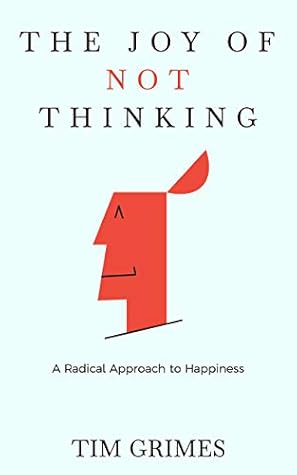More on this book
Community
Kindle Notes & Highlights
by
Tim Grimes
Read between
October 18 - October 24, 2019
So, what we’re really focusing on here is overthinking and being too serious. It can seem subtle, but when we feel worried or depressed, overthinking is the likely culprit.
The constant negativity we feel is largely a false projection that we create for ourselves.
Fearful, depressing beliefs were something fed to us when we were younger, and we ate them up unknowingly. These beliefs then went on to shape how we think about things.
In reality, we can drop most of this negativity.
Feeling good, shockingly, is wonderful and far better than feeling bad!
But it’s also profoundly effective if we do it. If you don’t overthink, you’ll feel better, and better things will happen to you.
“What is your philosophy of life?” “Think as little as possible.” – Charles Bukowski,
Introspective, quiet stress reduction exercises, such as meditation, can sometimes lead to mental anguish,
Not being serious, being really playful for a few minutes, never allows this.
If you feel stuck and are looking for a direct way to rapidly relieve stress and stop overthinking, being playfully
unserious is probably it.
We think ourselves sick because we’re unaware of the inherent freedom we possess.
our lives may seem extremely troubled and messy, but at the end of the day, we’re full of shit.
We’re soldiers fighting an unnecessary war.
Negative thoughts might be there, and that’s fine, but you don’t have to empower them and play into their seriousness.
Those negative mental judgments about your body, if you take them seriously, will make your physical suffering worse—while
Talking out loud to yourself can be especially effective if the tone is informal and unserious.
“Jeesh, buddy, you’re sure
acting like an asshole today, the whole day long you’re yammering about all this stupid stuff that makes no sense at all. Yo...
This highlight has been truncated due to consecutive passage length restrictions.
Sometimes, the most important thing you can do to improve certain problematic aspects of your life is not think about them.
The truth is exactly the opposite. Your problems will go away if you stop thinking about them altogether.”
But it should also be obvious—especially after having read this guide—that most of your thoughts about the problems in your life are not necessary to act upon. They’re usually just made-up, entirely negative, worst-case mental meanderings and mirages.
The majority of our worries are delusional. We spend so much time thinking about entirely hypothetical negative situations.
You’ll notice that even when you’re not really doing anything, you’re still
trying to do something else at the same time. Like when you’re waiting in line at the store. Or sitting on the bus. Or eating a sandwich. We can’t just relax and do a very simple activity like this.
Indifference, the way we’re talking about it, is meant to be “the peace of God, which passeth all understanding”
As our aspirations change with our age, they become less genuine.
And we become less genuine because we get lost in our thoughts and our ideas of what certain things will bring us. And the truth is they won’t bring us anything.
Don’t think. Try less, feel better. Vibe out. It’s not the way people think it should work. It’s the way it does work.
Moment-to-moment alignment with what’s around you isn’t glamorous, it’s ordinary. It just tells you everything is alright, and that’s enough. That’s all that we ever really want anyway.
We so often glamorize people and things and in the process delude ourselves. We don’t do this intentionally, but we do it nonetheless.
You become better in tune with what’s around you—and better things happen to you—by giving up the notion that there’s something superior to the life you’re living.


